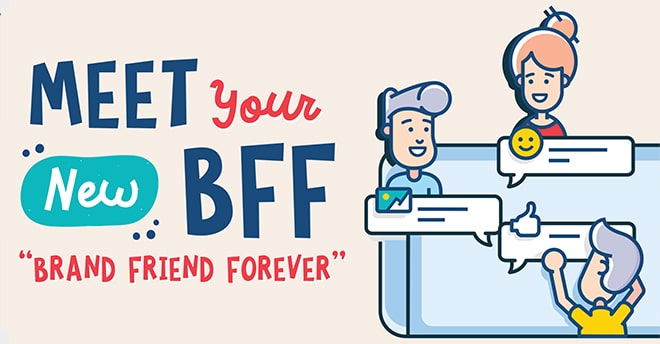Meet Your New BFF — “Brand Friend Forever”

My wife had a flat tire the other day and, like the good guy I would like everyone to believe I am, I put the spare on her car and planned a tire-shopping trip for the weekend.
Saturday morning rolled around and I posted on Facebook “Few things are a bigger waste of time on a Saturday than getting new tires.” That post was immediately answered by a nearby auto center offering to help me out. They knew I was in need, offered me a good guy discount and would even pick me up. They were so nice, I thought if I played my cards right they might even take me out for drinks and a movie.
They got me thinking, “Those auto center guys are really friendly.” They really care. After all, many of my friends saw, liked or even commented on my post, but none of them offered me a ride! Is this a brand I could be friends with? Is that even possible?
Your latest BFF may very well be the brand you follow these days. Brands have been working hard to blur the lines between “brand” and “friend.” The language and tone of social posts and comments coming from online brand resources has evolved as two-way communication including likes, shares, comments and memes.
The media landscape has changed and it’s no longer a question of if you will change with it, but how effectively you will adapt. Will you protect your brand? Can you leverage this two-way communication ecosystem to your advantage? Yes, you can.
Can a brand be a friend?
Brands are reputations. They have personality. They should stand for something. They can be good or bad. Just like friends.
Digital media gives a brand the ability to develop, enhance or even ruin their reputations with their communications. A brand can no longer control its own messaging by pushing forward highly-developed, traditional advertising in one-way communications. Now, consumers have a say. And they speak loudly and in real time.
This makes shifting to a friendlier tone and relationship building very important. If you feel you’re in a relationship with a brand, you are more willing to forgive small offenses and support efforts when it needs your help. We do this with our friends every day, but we are just now at beginning of relating to brands with the same empathy and support because of the way they communicate with us.
There are opposing views to the idea of a brand being your friend — and with good reason. There are ethical considerations to take into account. But these issues can be successfully navigated with a transparent approach to online communications and an understanding that this is a concept brands must not take too far.
Winning hearts and minds
During the course of a conversation with a friend, you may change your opinion. But in order to be swayed by a friend, you must have three things: trust, relevance and affection. Brands are working hard to get us on their side and to keep us there by using these three keys to friendship.

Trust
It is important for brands — and our friends — to have our trust. Trust forms a bond between us. The elements that trusted brands leverage include caring, listening and surprise.
Relevance
A brand must be relevant to those that follow and like the company. It must be useful or helpful in expressing your business’ personal style. We want our narrative to be like that of the brand. Communications that create a sense of relevance include story, style and connecting.
Affection
Affection gives us a real sense that a brand cares. Like a friend, they won’t always tell us what we want to hear; sometimes they’ll also share what we need to know. Brands using affection guide us to be who we want to be by leveraging honesty, advising and through loyalty.

Meaningful storytelling
The idea of brand friendship is packaged in the wrappings of storytelling. Content that tells stories consumers connect with creates the shared experience we all crave in other kinds of friendships and relationships. The ability to tell a meaningful story aimed at audiences that are on-target for your brand is deeply important in social and digital media.
The importance of honesty
Brands must learn to say the right thing at the right time and in the right place, just like a friend. It is important, however, to be honest in what is communicated. Digital audiences can smell dishonesty a mile away, and they are not afraid to call you out. So tell the truth, but tell it well.
Have fun and be fun
We hang out with our friends because they’re fun to be around, right? Brands should be the same way. They should challenge audiences with humor and should create an engaging tone. At the same time, brands should be respectful. They should not have fun at the expense of others. They should love puppies and care about the environment, even if they do it with some edginess when appropriate.
Don’t try too hard.
We’ve all had the experience of failing to connect in a relationship because we tried too hard. Presenting a brand as a “friend” is something you can definitely take too far. It is important for everyone communicating on behalf of your team to know where the boundaries are and exactly how far your brand should push the “friendly” envelope.